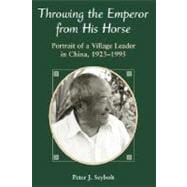
Note: Supplemental materials are not guaranteed with Rental or Used book purchases.
Purchase Benefits
What is included with this book?
| Preface | p. xi |
| Acknowledgments | p. xxv |
| Weights and Measures | p. xxvii |
| Introduction Houhua Village in Space and Time | p. 1 |
| Poverty, Bandits, and Japanese Invaders: Early Life, 1923-1946 | p. 19 |
| Return to Houhua Village: Land Reform and Establishing a Family, 1946-1953 | p. 31 |
| We Will Have a Bright Future": The Cooperative Movement and Joining the Communist Party, 1954-1957" | p. 41 |
| This is Not the Way to Do Farm Work: The Great Leap Forward, 1958-1960" | p. 51 |
| Five Winds," "Three Togethers," "Four Cleanups," and Other Campaigns, 1961-1965" | p. 59 |
| At the Risk of Death, Dare to Throw the Emperor from His Horse": The Great Proletarian Cultural Revolution, 1966-1976" | p. 65 |
| Houhua Village After Mao: Prosperity and Future Prospects, 1977-1990 | p. 77 |
| Retirement and Retrospective on Leadership | p. 89 |
| Houhua Village Under New Leadership, 1984-1990 | p. 99 |
| Facing an Uncertain Future: Houhua Village, 1994 | p. 117 |
| Notes | p. 131 |
| About the Book and Author | p. 137 |
| Table of Contents provided by Publisher. All Rights Reserved. |
The New copy of this book will include any supplemental materials advertised. Please check the title of the book to determine if it should include any access cards, study guides, lab manuals, CDs, etc.
The Used, Rental and eBook copies of this book are not guaranteed to include any supplemental materials. Typically, only the book itself is included. This is true even if the title states it includes any access cards, study guides, lab manuals, CDs, etc.